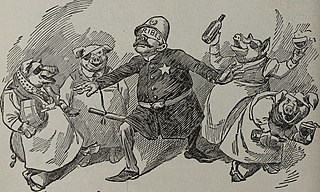
Political corruption is the use of powers by government officials or their network contacts for illegitimate private gain.

Police corruption is a form of police misconduct in which law enforcement officers end up breaking their political contract and abuse their power for personal gain. This type of corruption may involve one or a group of officers. Internal police corruption is a challenge to public trust, cohesion of departmental policies, human rights and legal violations involving serious consequences. Police corruption can take many forms, such as bribery.
The 2006 Republican Party scandals resulted in four resignations and three election losses for Republican politicians during the first two years of George W. Bush's second term as President and leading up to the 2006 midterm elections.

Corruption in the government of Kenya has a history which spans the era of the founding president Jomo Kenyatta, to Daniel arap Moi's KANU, Mwai Kibaki's PNU government and the current Uhuru Kenyatta's Jubilee Party government. In the Corruption Perceptions Index 2021 Kenya is ranked 128th out of 180 countries for corruption, tied with seven other countries, including Bolivia, Azerbaijan, Laos, and Paraguay.
The Hawala scandal, also called the Jain Diaries case or the hawala scam, was an Indian political and financial scandal involving payments allegedly sent by politicians through four hawala brokers, namely the Jain brothers. It was a US$18 million bribery scandal that implicated some of the country's leading politicians.

Corruption in South Africa includes the improper use of public resources for private ends, including bribery and improper favouritism. The 2017 Transparency International Corruption Perceptions Index assigned South Africa a score of 43 out of 100, ranking South Africa 71 out of 180 countries; a high score and a low ranking signals that the country's public sector is perceived to be honest. There was a marginal improvement by 2021, when South Africa received a score of 44, ranking it 70 out of 180 countries. Nonetheless, this remains below its score of 45 in 2016. Countries with scores below 50 are believed to have serious corruption problems.
Michael R. Veon is a former member of the Pennsylvania House of Representatives, representing the 14th District from 1985 through 2006.

Corruption in China post-1949 refers to the abuse of political power for private ends typically by members of the Chinese Communist Party (CCP), who hold the majority of power in the country. Corruption is a very significant problem in China, impacting all aspects of administration, law enforcement, healthcare and education. Since the Chinese economic reforms began, corruption has been attributed to "organizational involution" caused by the market liberalization reforms initiated by Deng Xiaoping. Like other socialist economies that have undertaken economic reforms, such as post-Soviet Eastern Europe and Central Asia, reform-era China has experienced increasing levels of corruption.

Operation Board Games is a federal fraud investigation initiated by United States Attorney Patrick Fitzgerald in December 2003, in order to investigate suspected fraud and extortion activity by Illinois Governor Rod Blagojevich. The investigation's name is a reference to two governing bodies in Illinois: one board controlling the Teacher's Pension System, and the second being the Health Facilities Planning Board.

Corruption in the United States is the act of government officials abusing their political powers for private gain, typically through bribery or other methods, in the United States government. Corruption in the United States has been a perennial political issue, peaking in the Jacksonian era and the Gilded Age before declining with the reforms of the Progressive Era.

Corruption in Pakistan is widespread, and extends to every sector from government to judiciary, police, health services and education.

Corruption in Colombia is a pervasive problem at all levels of government, as well as in the military and police forces. A general culture and awareness of this corruption permeates society as a whole. A Global Corruption Barometer survey from 2010 found that the institutions seen as most corrupt were the political parties and the parliament, followed by the police and public officials, the judiciary and the military. Transparency International's 2021 Corruption Perceptions Index, based on experts' and businesspeoples' perceptions of corruption in the public sector, gave Colombia a score of 39 on a scale from 0 to 100. When ranked by score, Colombia ranked number 87 among the 180 countries in the Index, where the country ranked number 1 is perceived to have the most honest public sector.

Corruption is a historical issue in Ukrainian society often tied to a troubled relationship with Russia. Since regaining independence from Russia; Ukraine has faced a series of politicians, criminal bosses, and oligarchs who used corruption of police, political parties, and industry to gain power. In response to mass corruption people lead a populist revolt which lead Euromaidan uprising and the 2014 Revolution of Dignity.

Corruption in Zimbabwe has become endemic within its political, private and civil sectors. Zimbabwe, along with Honduras, Iraq, and Cambodia, ranks 157th out of 180 countries in the 2021 Transparency International Corruption Perceptions Index, where a high ranking corresponds to a perception of high corruption in the public sector. On a scale of 0 to 100, the Corruption Perceptions Index gave Zimbabwe a score of 23. This marks an decrease in corruption since 2012, when the country was given a score of 20.

Corruption in Italy is a major problem. In Transparency International's annual surveys, Italy has consistently been regarded as one of the most corrupt countries in the Eurozone. Political corruption remains a major problem particularly in Lombardy, Campania and Sicily where corruption perception is at a high level. Political parties are ranked the most corrupt institution in Italy, closely followed by public officials and Parliament, according to Transparency International's. But in the 2013 Global Corruption Barometer report, Italy is in 17th position in front of the United Kingdom (18th), Switzerland (21st) and the United States (22nd).

Crime in Austria is combated by a range of Austrian law enforcement agencies.

Corruption is a relatively small but continuing issue within Cyprus.

Corruption in Malaysia is relatively low in comparison to the rest of East Asia and Southeast Asia. According to a 2013 public survey in Malaysia by Transparency International, a majority of the surveyed households perceived Malaysian political parties to be highly corrupt. A quarter of the surveyed households consider the government's efforts in the fight against corruption to be ineffective.
Crime in Peru has steadily decreased since the 2010s and into the 2020s. Peru's main indicators of crime are the homicide rate and the victimization rate; the victimization rate dropped from forty percent in 2011 to under twenty five percent in 2020.

FITSNews is a United States-based news website that covers politics and current events in South Carolina.
















